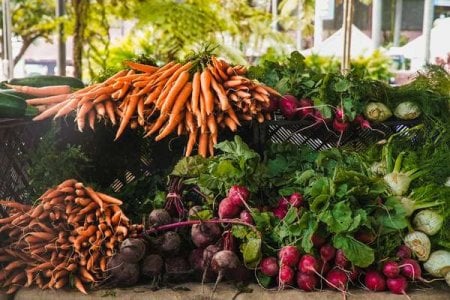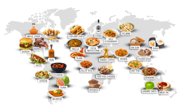Is your 'organic' food really organic? Shoppers are being misled—here’s what you need to know
By
Maan
- Replies 0
The rise of misleading product labels in Australia is a growing concern, particularly when it comes to the 'organic' label that many consumers trust.
What seems like a straightforward purchase could, in fact, be masking a much more complex issue.
As the debate heats up, it’s clear that the consequences of false advertising are far-reaching, affecting both consumers and producers alike.
A growing concern among organic farmers and retailers in Australia was the misleading use of the term ‘organic’ by some producers, who engaged in what was described as greenwashing.
Despite Australians often willing to pay a premium for ‘organic’ labelled products like meat, cheese, and cosmetics, producers were able to use the term without meeting any set standards or certification.
The Coalition had pushed the Albanese government to support a bill aimed at defining the term ‘organic’ legally and restricting its use on products sold domestically.
Sonya Dowling, an organic poultry producer and owner of Enviroganic Farm in New South Wales, stated that consumers were being misled and might not recognise the need for an official organic certification logo on products.
‘It’s not just poultry alone; it’s cosmetics, fruit and vegetables,’ she said.
‘It’s rife, unfortunately. A lot of these consumers are unassuming and they just don’t know … And they’re paying a huge premium for it.’
Dowling even discovered retailers using her business name alongside an ‘organic’ label on chicken she had never supplied.
Australia had implemented a national standard for organic goods exported since 1992, requiring producers to undergo audits by accredited bodies.
The agriculture department defined these practices as prioritising renewable resources, soil, water, energy conservation, livestock welfare, and environmental maintenance without synthetic chemicals.
However, this standard only applied to goods intended for export, leaving some products labelled ‘organic’ for the domestic market without being certified or made from 100% organic ingredients.
If the Coalition’s proposed legislation passed, the national export standard would be enforced for products sold within Australia.
Jackie Brian, CEO of Australian Organic Limited, highlighted that Australia was the last developed nation without domestic regulations for its organic industry.
‘From a consumer perspective, products that have only a very small percentage of organic ingredients can claim to be organic and can be labelled as such,’ she said.
‘I often get calls from organic operators that are certified and doing the right thing, and they’re facing competition at the point of sale from companies that are basically being fraudulent.’
Brian argued that implementing a national domestic standard would streamline the export process for producers, as they wouldn’t need to go through multiple expensive re-certification procedures for overseas recognition.
She pointed out that major trading partners, such as the US and South Korea, did not consider Australia’s organic export system ‘equivalent’ because of the lack of a domestic regulatory framework.
David Littleproud, the opposition’s agriculture spokesperson, noted that previous attempts to introduce domestic standards were hindered by disagreements among organic representative bodies.
He said: ‘There’s a little internal politics between the organic groups,’ he said. ‘And I’m not fully aware of the in-depth machinations between [the] industries, but that was the biggest sticking point – getting them all to agree.’
Littleproud suggested that the government’s reluctance to back the change stemmed from receiving ‘bad advice’ from the agriculture department.
He was confident that if the Greens supported the legislation, it would pass.
Though Peter Whish-Wilson, the Greens environment spokesperson, was unavailable for comment, sources indicated that the progressive party was likely to back the bill.
The Albanese government had not yet announced its stance. Agriculture Minister Julie Collins stated that the government would consider the recommendations from the inquiry examining the bill, due to report on 31 January.
Most organic retailers, producers, and even the Australian wine industry peak body had supported the domestic standard during the inquiry.
The agriculture department acknowledged that domestic regulation of the organic industry had been a ‘long-standing issue,’ noting that introducing a mandatory standard would help ensure certification for all organic producers and improve consumer trust.
The department also recognised concerns that a mandatory scheme might disproportionately affect smaller operators, especially those already making a genuine effort to produce organic goods but whose practices did not align with the new standard.
The proposal included a three-year transition period for producers to gain certification, with small operators earning less than $25,000 annually exempt from certification.
The Australian Honey Bee Industry Council also expressed concerns, acknowledging the legislation’s impact on smaller honey producers.
Erin Turner, CEO of the Consumer Policy Research Centre, argued that ‘organic’ was just one of many ‘confusing green terms’ applied to a variety of products in Australia.
‘Australia needs clearer rules for green claims,’ she said.
‘Ensuring the term organic is defined and limited only to genuinely organic products is a good start.’

As the debate over what qualifies as 'organic' continues, it raises an important question: how much trust can we place in the labels on our products? Share your thoughts with us in the comments.
What seems like a straightforward purchase could, in fact, be masking a much more complex issue.
As the debate heats up, it’s clear that the consequences of false advertising are far-reaching, affecting both consumers and producers alike.
A growing concern among organic farmers and retailers in Australia was the misleading use of the term ‘organic’ by some producers, who engaged in what was described as greenwashing.
Despite Australians often willing to pay a premium for ‘organic’ labelled products like meat, cheese, and cosmetics, producers were able to use the term without meeting any set standards or certification.
The Coalition had pushed the Albanese government to support a bill aimed at defining the term ‘organic’ legally and restricting its use on products sold domestically.
Sonya Dowling, an organic poultry producer and owner of Enviroganic Farm in New South Wales, stated that consumers were being misled and might not recognise the need for an official organic certification logo on products.
‘It’s not just poultry alone; it’s cosmetics, fruit and vegetables,’ she said.
‘It’s rife, unfortunately. A lot of these consumers are unassuming and they just don’t know … And they’re paying a huge premium for it.’
Dowling even discovered retailers using her business name alongside an ‘organic’ label on chicken she had never supplied.
Australia had implemented a national standard for organic goods exported since 1992, requiring producers to undergo audits by accredited bodies.
The agriculture department defined these practices as prioritising renewable resources, soil, water, energy conservation, livestock welfare, and environmental maintenance without synthetic chemicals.
However, this standard only applied to goods intended for export, leaving some products labelled ‘organic’ for the domestic market without being certified or made from 100% organic ingredients.
If the Coalition’s proposed legislation passed, the national export standard would be enforced for products sold within Australia.
Jackie Brian, CEO of Australian Organic Limited, highlighted that Australia was the last developed nation without domestic regulations for its organic industry.
‘From a consumer perspective, products that have only a very small percentage of organic ingredients can claim to be organic and can be labelled as such,’ she said.
‘I often get calls from organic operators that are certified and doing the right thing, and they’re facing competition at the point of sale from companies that are basically being fraudulent.’
Brian argued that implementing a national domestic standard would streamline the export process for producers, as they wouldn’t need to go through multiple expensive re-certification procedures for overseas recognition.
She pointed out that major trading partners, such as the US and South Korea, did not consider Australia’s organic export system ‘equivalent’ because of the lack of a domestic regulatory framework.
David Littleproud, the opposition’s agriculture spokesperson, noted that previous attempts to introduce domestic standards were hindered by disagreements among organic representative bodies.
He said: ‘There’s a little internal politics between the organic groups,’ he said. ‘And I’m not fully aware of the in-depth machinations between [the] industries, but that was the biggest sticking point – getting them all to agree.’
Littleproud suggested that the government’s reluctance to back the change stemmed from receiving ‘bad advice’ from the agriculture department.
He was confident that if the Greens supported the legislation, it would pass.
Though Peter Whish-Wilson, the Greens environment spokesperson, was unavailable for comment, sources indicated that the progressive party was likely to back the bill.
The Albanese government had not yet announced its stance. Agriculture Minister Julie Collins stated that the government would consider the recommendations from the inquiry examining the bill, due to report on 31 January.
Most organic retailers, producers, and even the Australian wine industry peak body had supported the domestic standard during the inquiry.
The agriculture department acknowledged that domestic regulation of the organic industry had been a ‘long-standing issue,’ noting that introducing a mandatory standard would help ensure certification for all organic producers and improve consumer trust.
The department also recognised concerns that a mandatory scheme might disproportionately affect smaller operators, especially those already making a genuine effort to produce organic goods but whose practices did not align with the new standard.
The proposal included a three-year transition period for producers to gain certification, with small operators earning less than $25,000 annually exempt from certification.
The Australian Honey Bee Industry Council also expressed concerns, acknowledging the legislation’s impact on smaller honey producers.
Erin Turner, CEO of the Consumer Policy Research Centre, argued that ‘organic’ was just one of many ‘confusing green terms’ applied to a variety of products in Australia.
‘Australia needs clearer rules for green claims,’ she said.
‘Ensuring the term organic is defined and limited only to genuinely organic products is a good start.’
Key Takeaways
- Many Australian consumers are unknowingly paying a premium for products falsely labelled as 'organic'.
- There is currently no legal definition for the term ‘organic’ in Australia, allowing producers to use it without certification.
- The Coalition has proposed a bill to create a mandatory national standard for organic products, aiming to protect consumers and make exports easier.
- Smaller producers may face challenges if the legislation passes, as it could impose additional certification costs on them.
As the debate over what qualifies as 'organic' continues, it raises an important question: how much trust can we place in the labels on our products? Share your thoughts with us in the comments.








